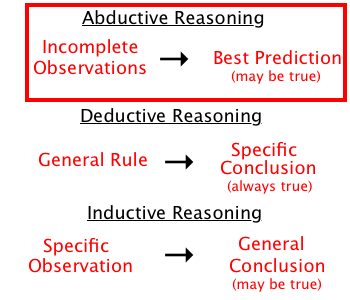Abductive reasoning (abductive approach)
Abductive reasoning, also referred to as abductive approach is set to address weaknesses associated with deductive and inductive approaches. Specifically, deductive reasoning is criticized for the lack of clarity in terms of how to select theory to be tested via formulating hypotheses. Inductive reasoning, on other hand, criticized because “no amount of empirical data will necessarily enable theory-building”[1]. Abductive reasoning, as a third alternative, overcomes these weaknesses via adopting a pragmatist perspective.
The figure below illustrates the main differences between abductive, deductive and inductive reasoning:
At the same time, it has to be clarified that abductive reasoning is similar to deductive and inductive approaches in a way that it is applied to make logical inferences and construct theories.
In abductive approach, the research process starts with ‘surprising facts’ or ‘puzzles’ and the research process is devoted their explanation[2]. ‘Surprising facts’ or ‘puzzles’ may emerge when a researchers encounters with an empirical phenomena that cannot be explained by the existing range of theories.
When following an abductive approach, researcher seeks to choose the ‘best’ explanation among many alternative in order to explain ‘surprising facts’ or ‘puzzles’ identified at the start of the research process. In the course of explaining ‘surprising facts’ or ‘puzzles’, the researcher can combine both, numerical and cognitive reasoning.
Despite its increasing popularity in business studies, application of abductive reasoning in practice is challenging and you are advised to stick with traditional deductive or inductive approaches when writing your dissertation if it is the first time you are writing a dissertation…
My e-book, The Ultimate Guide to Writing a Dissertation in Business Studies: a step by step assistance contains discussions of theory and application of research approaches. The e-book also explains all stages of the research process starting from the selection of the research area to writing personal reflection. Important elements of dissertations such as research philosophy, research design, methods of data collection, data analysis and sampling are explained in this e-book in simple words.
John Dudovskiy
[1] Source: Saunders, M., Lewis, P. & Thornhill, A. (2012) “Research Methods for Business Students” 6th edition, Pearson Education Limited
[2] Bryman A. & Bell, E. (2015) “Business Research Methods” 4th edition, Oxford University Press, p.27


